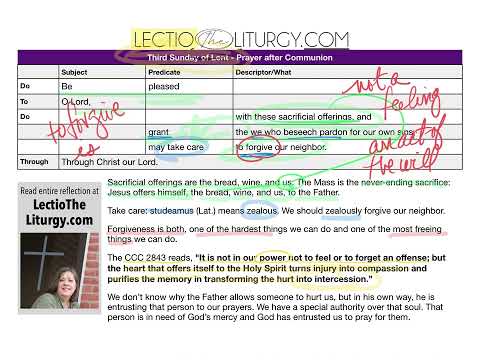3rd Sunday of Lent - Prayer over the Offering
The topic of this prayer has come up so many times in the past week, I began to wonder what God was up to. I should have guessed that it was the topic of the prayer in the Roman Missal for this week, the Third Sunday in Lent.
Be pleased, O Lord, with these sacrificial offerings, and grant that we who beseech pardon for our own sins, may take care to forgive our neighbor. Through Christ our Lord.
Sacrificial offerings are pleasing to God because they are not only the bread and wine, they include us. The Mass is the never-ending sacrifice of Jesus to the Father; Jesus offers himself, the bread, wine, and us, and gives them to the Father.
One way to think being an offering, is, at Mass, when the gifts, the bread and wine, are brought to the altar and given to the priest, you are among those gifts that Jesus offers to the Father. Of course, God is pleased when we are willing to be that sacrifice.
The prayer also tells us about the disposition in our heart. We ask God to grant, or allow, that we who beg for forgiveness, forgive others. Actually, in the Late form of the prayer, the word for “take care” is studeamus, it means zealous. We zealously forgive our neighbor.
Forgiveness is both, one of the hardest things we can do and one of the most freeing things we can do.
If someone has deeply wounded us, forgiveness is the last thing we feel like doing. What we need to know is that forgiveness, like love, is not a feeling. It is a decision, an act of the will.
Forgiveness doesn’t let the guilty party off the hook, as if what they did never happened. Holding on to unforgiveness does not bring happiness and it can actually make us physically sick. Holding on to unforgiveness is like drinking poison and expecting the other person to die. However, when you forgive someone, it takes you out of an equation and leaves the “wound-er” to answer to God
There’s something else, though. God’s design for forgiveness carries great power. The Catechism of the Catholic Church 2843 reads, "It is not in our power not to feel or to forget an offense; but the heart that offers itself to the Holy Spirit turns injury into compassion and purifies the memory in transforming the hurt into intercession.”
Some trespasses are minor, some cause deep pain and there is no way we can forgive on our own, but as the Catechism states, we need to offer it to the Holy Spirit. In turn, the injury becomes compassion and the memory is purified, the hurt becomes intercession.
This is where the power comes in. Sometimes, ok, often times, we don’t know why the Father allows someone to hurt us, but in his own way, he is entrusting that person to our prayers. We have a special authority over that soul. That person is in need of God’s mercy and God has entrusted us to pray for them.
Is it easy to pray for someone who hurt you? No. Is it easy to forgive them? No. Not the first time, anyway. I have been deeply wounded by people who were entrusted by the Church to care for others. The wounds were deep, but I knew that God was telling me that my identity did not come from those wounds. My identity comes from the freedom that God offered, and I trusted him.
He did just what the Catechism says, the injury turned into compassion, the hurt was transformed into intercession. Even though the scar remains, the pain was gone, my suffering was just like Jesus’. The freedom he gave me was so intense that it made me want to do it again.
Forgiveness is a lifestyle now. I now walk in freedom and from my identity as a beloved daughter of the King. Life is too short to have it any other way.
If you’re having trouble forgiving, reach out. God desires freedom for you, too. Forgiveness may come quickly for you or it can take a while. Sometimes it’s like the layers of an onion, but as each layer is peeled away, more shackles fall off your heart and it won’t be long before your unbound heart is free to love again.
Thanks for praying with me, and know that I am praying for you.
Julie
